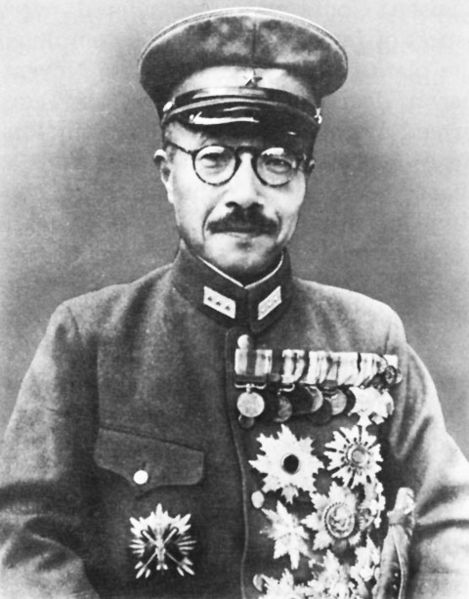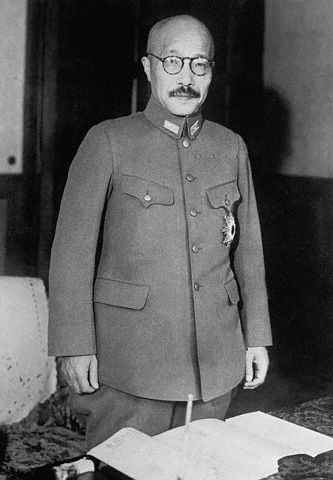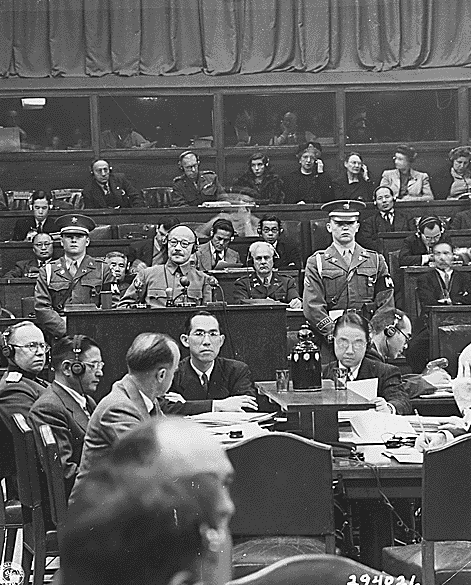<Back to Index>
- Explorer Helge Marcus Ingstad, 1899
- Author Rudyard Kipling, 1865
- Prime Minister of Japan Hideki Tōjō, 1884
PAGE SPONSOR



Hideki Tōjō (30 December 1884 – 23 December 1948) was a general in the Imperial Japanese Army, member and succeeding leader of the Taisei Yokusankai and the 40th Prime Minister of Japan during much of World War II, from 18 October 1941 to 22 July 1944. Some historians hold him responsible for the bombing of Pearl Harbor, which led to America's direct involvement in World War II. After the end of the war, Tōjō was sentenced to death for war crimes by the International Military Tribunal for the Far East and executed by hanging on 23 December 1948.
Hideki Tōjō was born in the Kōjimachi district of Tokyo in 1884. He was the third son of Hidenori Tōjō, a lieutenant general in the Imperial Japanese Army. Tōjō's two older brothers died before his birth, therefore he was considered the oldest and received the treatment and rights that an eldest child of Japan would receive, which includes an immense amount of honor. In 1909 he married Katsuko Ito, with whom he had three sons and four daughters.
In 1933, Tōjō was promoted to major general and served as Chief of the Personnel Department within the Army Ministry. He was appointed commander of the IJA 24th Infantry Brigade in August 1934. In September 1935, Tōjō was transferred to become commander of the Kempeitai of the Kwangtung Army in Manchuria. Tōjō's nickname was "Razor" (Kamisori), earned for his reputation for a sharp, legalistic mind capable of making quick decisions.
During the February 26 Incident of 1936, Tōjō and Shigeru Honjō, a noted supporter of Sadao Araki, came out against the coup attempt. Emperor Hirohito himself was outraged at the attacks on his close advisors, and after a brief political crisis and stalling on the part of a sympathetic military, the rebels were forced to surrender. In the aftermath, the Toseiha was able to purge the Army of radical officers, and the coup leaders were tried and executed. Following the purge, Toseiha and Kōdōha elements were unified in their conservative but highly anti-political stance under the banner of the Kōdōha military clique, with Tōjō in a leadership position.
Tōjō was promoted to Chief of Staff of the Kwangtung Army. As Chief of Staff, Tōjō was responsible for various military operations to increase Japanese penetration into the Mongolia and Inner Mongolia border regions with Manchukuo. In July 1937, he personally led the units of the 1st Independent Mixed Brigade in Operation Chahar. After the Marco Polo Bridge Incident marking the start of the Second Sino-Japanese War, Tōjō ordered his forces to move against Hopei and other targets in northern China.
Tōjō was recalled to Japan in May 1938 to serve as Vice-Minister of Army under Army Minister Seishirō Itagaki.
From December 1938 to 1940, Tōjō was Inspector-General of Army
Aviation. On October 18, 1941, Tōjō was appointed Army Minister in the
second Fumimaro Konoe Cabinet,
and remained in that post in the third Konoe Cabinet. He was a strong
supporter of the Tripartite Alliance between Japan, Nazi Germany and Fascist Italy.
As Army Minister he continued to expand the war with China. After
negotiations with the Vichy Government, Japan was given permission to
place elements of its army in French Indochina in July 1941. In spite of its formal recognition of the Vichy Government as legitimate, the United States retaliated against Japan by imposing economic sanctions in August, and a total embargo on oil and gasoline exports. On
6 September, a deadline of early October was fixed in Imperial
conference for continuing negotiations. On 14 October, the deadline had
passed with no progress. Prime minister Konoe then held his last cabinet meeting, where Tōjō did most of the talking: For
the past six months, ever since April, the foreign minister has made
painstaking efforts to adjust relations. Although I respect him for
that, we remain deadlocked...The heart of the matter is the imposition
on us of withdrawal from Indochina and China...If we yield to America's
demands, it will destroy the fruits of the China incident. Manchukuo
will be endangered and our control of Korea undermined. The prevailing opinion within the Japanese Army at that time was that continued negotiations could be dangerous. However, Hirohito thought that he might be able to control extreme opinions in the army by using
the charismatic and well-connected Tōjō, who had expressed reservations
regarding war with the West, although the emperor himself was skeptical
that Tōjō would be able to avoid conflict. On October 13, he declared to Kōichi Kido:
'"There seems little hope in the present situation for the Japan-U. S.
negotiations. This time, if hostilities erupt, I might have to issue a
declaration of war." On 16 October, Konoe,
politically isolated and convinced that the emperor no longer trusted
him, resigned. Later, he justified himself to his chief cabinet
secretary, Kenji Tomita: Of
course his majesty is a pacifist, and there is no doubt he wished to
avoid war. When I told him that to initiate war is a mistake, he
agreed. But the next day, he would tell me: "You were worried about it
yesterday, but you do not have to worry so much." Thus, gradually, he
began to lead toward war. And the next time I met him, he leaned even
more toward war. In short, I felt the Emperor was telling me: "My prime
minister does not understand military matters, I know much more." In
short, the Emperor had absorbed the views of the army and navy high
commands. At the time, Prince Higashikuni Naruhiko was
said to be the only person who could control the Army and the Navy and
was recommended by Konoe and Tōjō. Hirohito rejected this option,
arguing that a member of the imperial family should not have to
eventually carry the responsibility for a war against the Occident.
Following the advice of Kōichi Kido, he chose instead Tōjō, who was known for his devotion to the imperial institution. The Emperor summoned Tōjō to the Imperial Palace one day before Tōjō took office. Tōjō
wrote in his diary, "I thought I was summoned because the Emperor was
angry at my opinion." He was given one order from the Emperor: To make
a policy review of what had been sanctioned by the Imperial
conferences. Tōjō, who was on the side of the war, nevertheless
accepted this order, and pledged to obey. According to colonel Akiho
Ishii, a member of the Army General Staff, the prime minister showed a
true sense of loyalty to the emperor performing this duty. For example,
when Ishii received from Hirohito a communication saying the Army
should drop the idea of stationing troops in China to counter military
operations of occidental powers, he wrote a reply for the prime
minister for his audience with the emperor. Tōjō then replied to Ishii:
"If the emperor said it should be so, then that's it for me. One cannot
recite arguments to the emperor. You may keep your finely phrased
memorandum." On November 2, Tōjō and Chiefs of Staff Hajime Sugiyama and Osami Nagano reported to Hirohito that the review had been in vain. The Emperor then gave his consent to war. On 3 November, Nagano explained in detail the Pearl Harbor attack to Hirohito.
The eventual plan drawn up by Army and Navy Chiefs of Staff envisaged
such a mauling of the Western powers that Japanese defense perimeter
lines — operating on interior lines of communications and inflicting
heavy Western casualties — could not be breached. In addition, the
Japanese fleet which attacked Pearl Harbor was under orders from Admiral Isoroku Yamamoto to be prepared to return to Japan on a moment's notice, should negotiations succeed. On
5 November, Hirohito approved in Imperial conference the operations
plan for a war against the West and had many meetings with the military
and Tōjō until the end of the month. On 1 December, another imperial
conference finally sanctioned the "War against the United States,
England and Holland". Tōjō
continued to hold the position of Army Minister during his term as
Prime Minister, from 18 October 1941 to 22 July 1944. He also served
concurrently as Home Minister from 1941 - 1942, Foreign Minister in September 1942, Education Minister in 1943, and Commerce Minister in 1943. As Education Minister, he continued militaristic and nationalist indoctrination
in the national education system, and reaffirmed illiberal policies in
government. As Home Minister, he approved of various eugenics measures. His popularity was high in the early years of the war, as Japanese forces went from one victory to another. However, after the Battle of Midway,
with the tide of war turning against Japan, Tōjō faced increasing
opposition from within the government and military. To strengthen his
position, in February 1944 Tōjō assumed the post of Chief of the Imperial Japanese Army General Staff. However, after the fall of Saipan, he was forced to resign on 18 July 1944. He retired to the first reserve list and went into seclusion. After Japan's unconditional surrender in 1945, U.S. General Douglas MacArthur issued orders for the arrest of the first forty alleged war criminals, including Tōjō. Soon, Tōjō's home in Setagaya was
besieged with newsmen and photographers. Inside, a doctor named Suzuki
had marked Tōjō's chest with charcoal to indicate the location of his
heart. When American military police surrounded the house on 8
September 1945, they heard a muffled shot from inside. Major Paul Kraus
and a group of military police burst in, followed by George Jones, a
reporter for The New York Times.
Tōjō had shot himself 4 times in the chest, but despite shooting
directly through the mark, the bullets missed his heart and penetrated
his stomach. At 4:29, now disarmed and with blood gushing out of his
chest, Tōjō began to talk, and two Japanese reporters recorded his
words. "I am very sorry it is taking me so long to die," he murmured.
"The Greater East Asia War was
justified and righteous. I am very sorry for the nation and all the
races of the Greater Asiatic powers. I wait for the righteous judgment
of history. I wished to commit suicide but sometimes that fails." He
was arrested and underwent emergency surgery in a U.S. Army hospital,
where he was cared for postoperatively by Capt. Roland Ladenson. After
recovering from his injuries, Tōjō was moved to the Sugamo Prison. He was tried by the International Military Tribunal for the Far East for war crimes and found guilty of the following crimes: Hideki Tōjō accepted full responsibility in the end for his actions during the war. Here is a passage from his statement, which he made during his war crimes trial: He was sentenced to death on 12 November 1948 and executed by hanging on 23 December 1948. In his final statements he apologized for the atrocities committed by the Japanese military and urged the American military to show compassion toward the Japanese people, who had suffered devastating air attacks and the two atomic bombings. Tōjō is often considered responsible for authorizing the murder of millions of civilians in China, the Philippines, Indochina, and other Pacific island nations, as well as tens of thousands of Allied POWs. Tōjō is also implicated in government-sanctioned experiments on POWs and Chinese civilians (Unit 731).
Like his German counterparts, Tōjō often claimed to be carrying out
orders; in his case those of the Emperor, who was granted immunity from
war crimes prosecution. Many historians criticize the work done by MacArthur and his staff to exonerate Emperor Hirohito (Emperor Shōwa) and all members of the imperial family from criminal prosecutions. According to them, MacArthur and Brig. Gen. Bonner Fellers worked
to protect the Emperor from the role he had played during and at the
end of the war and attribute ultimate responsibility to Tōjō. According to the written report of Shuichi Mizota, interpreter for Admiral Mitsumasa Yonai,
Fellers met the two men at his office on 6 March 1946 and told Yonai
that: "it would be most convenient if the Japanese side could prove to
us that the Emperor is completely blameless. I think the forthcoming
trials offer the best opportunity to do that. Tōjō, in particular,
should be made to bear all responsibility at this trial." The
sustained intensity of this campaign to protect the Emperor was
revealed when, in testifying before the tribunal on 31 December 1947,
Tōjō momentarily strayed from the agreed-upon line concerning imperial
innocence and referred to the Emperor's ultimate authority. The
American-led prosecution immediately arranged that he be secretly
coached to recant this testimony. Ryūkichi Tanaka, a former general who testified at the trial and had close connections with chief prosecutor Joseph Keenan, was used as an intermediary to persuade Tōjō to revise his testimony.
Tōjō's commemorating tomb is located in a shrine in Hazu, Aichi, and he is one of those enshrined at the controversial Yasukuni Shrine. He was survived by a number of his descendants, including his granddaughter, Yūko Tōjō, a right-wing nationalist
and political hopeful who claims Japan's was a war of self-defense and
that it was unfair that her grandfather was judged a Class-A war criminal.
Tōjō's second son, Teruo Tōjō, who designed fighter and passenger
aircraft during and after the war, eventually served as an executive at Mitsubishi Heavy Industries.
“ It
is natural that I should bear entire responsibility for the war in
general, and, needless to say, I am prepared to do so. Consequently,
now that the war has been lost, it is presumably necessary that I be
judged so that the circumstances of the time can be clarified and the
future peace of the world be assured. Therefore, with respect to my
trial, it is my intention to speak frankly, according to my
recollection, even though when the vanquished stands before the victor,
who has over him the power of life and death, he may be apt to toady
and flatter. I mean to pay considerable attention to this in my
actions, and say to the end that what is true is true and what is false
is false. To shade one's words in flattery to the point of
untruthfulness would falsify the trial and do incalculable harm to the
nation, and great care must be taken to avoid this. ”